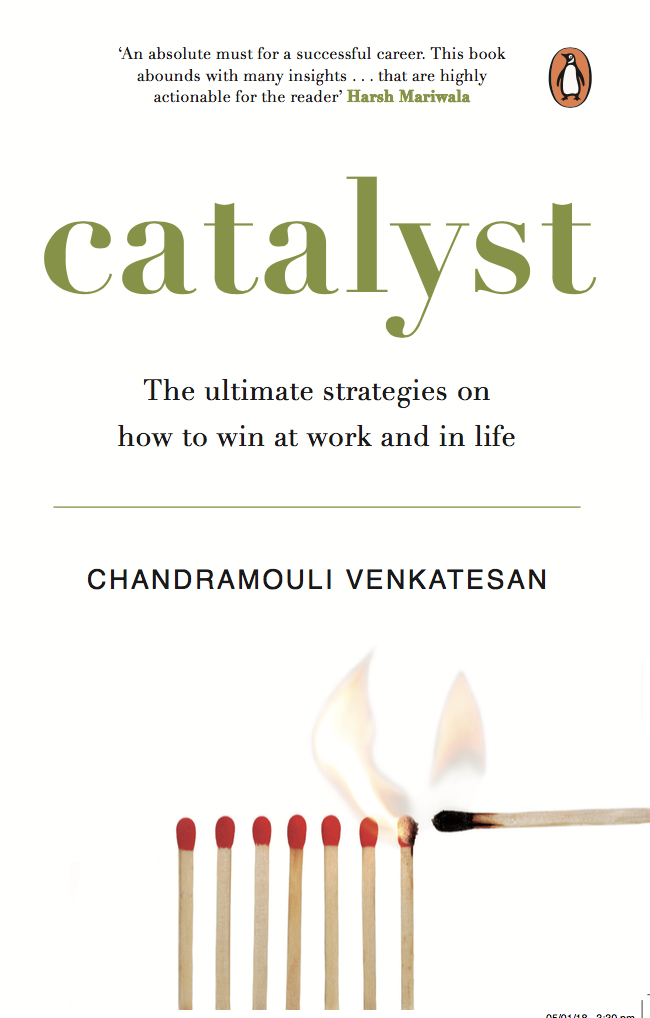This is an excerpt from the book ‘Catalyst’ by Chandramouli Venkatesan. Chandramouli Venkatesan has a strong corporate track record of over twenty-five years. An alumnus of Anna University, Chennai, and XLRI, Jamshedpur, he has worked in a variety of sectors in different roles. This excerpt has been taken from the chapter, ‘Real Individual Growth, the Catalyst for Success’. It talks about the impact of environmental aspects on career growth and describes one of the most common misconceptions about individual growth.
In all my experiences and travels across the world, the one thing that has stood out is the hunger for success that most people have, Indians in particular. Often, that hunger for success is simplified by most people into a desire for success and growth in their careers. Success in life is equal to success in career is often the operating assumption of most people.
In the latter portion of the book, I do try to give a more holistic dimension to success in life by including values, character and other related aspects. However, in the first half of the book, I focus primarily on giving people what they want—the keys to success at work.
I have a simple equation for career growth:
Career growth = Real individual growth ± Environmental aspects
‘Real individual growth’ is the growth we experience in the duration of our careers—how much each one of us grows our knowledge, our skills, our judgement, our influence, our communication, etc. The second factor is ‘environmental aspects’, which covers things like the buoyancy of the job market, industry-related factors, relative availability of talent in your skill areas, etc.
When in Business, do it like Sindhis!
Let me first cover the impact of environmental aspects on career growth. Our careers are typically forty years long. We start in our twenties and wind it up in our sixties. During these forty years, we will have both environmental tailwinds and headwinds in our careers. An example of a tailwind would be the times in your career when the job market is hyper-hot for the skills you have and there is a shortage of the skills you bring to the table.
People tend to get jobs and salaries bigger than what they deserve, sometimes leading to short-lived growth ‘bubbles’. Another example of a tailwind is when your boss quits the company, you are not yet fully ready to take on that role, but the company decides it would rather go with an insider and thus gives the job to you regardless. Such tailwinds are bound to support most of us in our careers at one time or the other.

Similarly, we have all also experienced headwinds in our careers. There are times when the economy is dragging, the job market is weak and there are very few opportunities for growth. Another example of a headwind is when you have been steadily getting ready for a big job, equipping yourself with the right experiences, apprenticing under the right leaders and preparing yourself for the opportunity, and when the opportunity comes, the company decides it wants new thinking and a change in strategy, and hence prefers to hire an outsider for the role as opposed to promoting an insider. You did nothing wrong, but the dice did not roll your way.
My experience is that in a forty-year career, the headwinds and the tailwinds balance each other out. You have to be a very lucky person for the tailwinds over forty years to be greater than the headwinds, and similarly, you have to be very unlucky for the headwinds to be greater than the tailwinds. For most people, the two balance out. Hence, going back to our career growth equation, this means that the environmental aspects will not be the deciding factor in driving career growth.
The catalyst for career growth tends to be real individual growth. Simply put, your career will grow only as much as you are able to grow as an individual and as a professional—what I call real individual growth. If you manage to grow your skills, your knowledge, your decision-making ability, your judgment, your influence on others, your communication skills, etc., then you will experience career growth.
Career growth is directly proportional to, and is a function of, real individual growth. If you stop pushing yourself at any stage, your career growth also comes to a screeching halt.
Challenges of Being a Start-Up CEO!
Hence the equation of career growth can be simplified to:
Career growth = Real individual growth
One way I like to state this is through the expression ‘You get what you deserve’. Far too often in our careers, we focus on getting part of it. We focus on getting the promotion, getting a new job, getting career growth. We do not focus on deserving more by increasing our capabilities, our skills, and so on. In a career, you get only what you deserve. It is useful to remember what is in our hands and focus on deserving more and driving our real individual growth.
My belief is that if we stop focusing on career growth and put all our energies into real individual growth, towards deserving more, then we will experience greater career growth. It keeps our focus firmly on what we can influence, working on ourselves, rather than distracting ourselves with the thought of career growth all the time— which can cause anxiety and result in poor choices.
To use a sporting analogy, if you want to become the captain of the team, you must focus on hitting the next ball out of the ground. If you continuously keep hitting the balls out of the ground, there is a chance that one day, you will be the captain. If you are desperately trying to become the captain, there will be so much anxiety that you will stop hitting the ball out of the park, which will then diminish your chances of achieving your goal.
There is a similar thought in Indian philosophy—‘Tu karm kar, phal ki chinta mat kar’. Loosely translated, it means, ‘Focus on the deeds, don’t worry about the results’. I am sure similar thoughts exist in all cultures and religions. This particular one comes from the Bhagavad Gita and was spoken by Lord Krishna. For a while, I used to be intrigued about whether it is even possible to practice that philosophy, to focus only on the deeds, and not bother about the results. Aren’t results important? How practical is it to not bother about the results and only bother about the deeds? It took me many conversations and careful reflection to get my own thinking and understanding on this sorted out.
My understanding now is—the probability of getting the result you want increases when you stop thinking about the results and start focusing on the deeds for getting that result. Going back to our sporting analogy, if you want to become the captain of the cricket team, then the deeds towards that result are scoring consistently, becoming a leader among your fellow players, understanding the strategies of the game, etc.
If you focus on these deeds, then you maximize the probability of becoming the captain, but if you focus on becoming the captain without focusing on the deeds, you actually reduce your probability of attaining your goal.
Why Skill Development is Really Important for Success
I believe career growth is something like that—the more you focus on it, the less effective it is. Instead, the more you focus on the deeds which lead to career growth, which is really individual growth, the more likely you are to have positive career growth. If you stop thinking about career growth—the next job, the next promotion—and instead be relentless in growing yourself and becoming continuously better—improving your knowledge, skills, judgment, influence, communication, etc.—the more career growth you will experience. Real individual growth, my friends, is the catalyst, the ‘deeds’ for the result called career growth.
So what does real individual growth mean and how does one drive it? This is where Catalyst, the book, comes in. One of the most common misconceptions is that real individual growth happens by itself. Most people assume that if they work hard and spend years at work, then they are growing their skills, knowledge, and capabilities. That is a misconception. Time and hard work alone do not drive real individual growth; it needs to be catalyzed.
There are four core areas where this has to be done
Experience Needs a Catalyst
The first area is that of our learning model. Our simplistic assumption is that if we spend enough time at work and work hard, then we are learning and gaining experience. This is fundamentally wrong. Time spent at work is not equal to experience. If that were true, all those with the same amount of work experience would be equally successful. Experience is not gained automatically; it has to be catalyzed.
Higher Productivity Needs a Catalyst
The next assumption is in the area of personal productivity. We assume that as we keep growing, our productivity keeps increasing as well. This assumption is wrong. It has to be catalyzed; it will not grow by itself. Many people get to senior levels or even higher levels and fail, not because of a lack of capability, but because their productivity has not grown by itself over the years. Now they are caught, as they face the complex multi-stakeholder, multitasking environment of senior roles requiring higher personal productivity—the improvement that they have not catalyzed. Productivity does not increase by itself; it has to be catalyzed.
How Millennials are Driving the Evolution of Employee Engagement
Catalysts for Career Management
The next area that requires a catalyst is that of career management. Our simplistic assumption is that if we succeed in the first halves of our careers, we will automatically succeed in the second halves as well. This assumption is also incorrect. The second half needs the catalysts of specific efforts and actions. Let’s take two people with roughly similar qualifications and compare their career success after they have retired.
Let us assume for a moment that one has been very successful while the other has been moderately successful. You will find that the bulk of their success difference developed only in the second halves of their careers. At the end of the first halves, they would have been equally successful. Most people are successful in the first halves of their careers, but very few in the second. Career success in the second half doesn’t happen by itself based on success in the first half; it has to be catalyzed.
Life and Values as Catalysts for Success
The next area is that of the work-life interaction. Another simplistic assumption we make is that work has a huge impact on life, hence the focus on areas like work-life balance, stress management, and so on. In my opinion, the impact of work on life is lower than the impact of life on work. How we lead our lives has a huge impact on how successful we are at work and, indeed, in life. There are a set of things that can have a tremendous positive catalyzing impact on our long-term success at work. Success at work doesn’t happen by just slogging at work; it is catalyzed by the way we live our lives.
13 Traits of Highly Effective Startup Entrepreneurs
Career growth is driven by real individual growth. And real individual growth does not happen simply by working hard and spending years gathering experience. How you can catalyze your real individual growth is the objective of this book, and the focus of the following chapters.
While there are three distinct sections in the book—the first on experience-building, the second on career management, and the third on life and values—it is not necessary to see them in a sequential way. You need not work first on experience, then on career management and then on life and values. It is fine to work on all of them at the same time.
Accessible, engaging and easy to follow, and written by someone who has experienced all this in real life and not in theory, Catalyst will arm you with the right tools to succeed at your workplace and get the most out of every moment, every day.
What to do next?
All the free upGrad courses under the Lifelong Learning initiative have been crafted in collaboration with leading industry experts. As always, like all upGrad offerings, these courses will be taught by best-in-class instructors.
So, how about upskilling with upGrad’s Lifelong Learning initiative?
Say YES and register now!


























![Top 15 Highest Paying Non-IT Jobs in India [2024]](/__khugblog-next/image/?url=https%3A%2F%2Fd14b9ctw0m6fid.cloudfront.net%2Fugblog%2Fwp-content%2Fuploads%2F2020%2F08%2F936-Highest-Paying-Non-IT-Jobs-in-India.png&w=3840&q=75)
![Top 15 Trending Online Courses in 2024 [For Both Students & Working Professionals]](/__khugblog-next/image/?url=https%3A%2F%2Fd14b9ctw0m6fid.cloudfront.net%2Fugblog%2Fwp-content%2Fuploads%2F2019%2F07%2FBlog_FI_July_upGrads-Career-advice.png&w=3840&q=75)
![10 Best Job-Oriented Short Term Courses Which are In-Demand [updated 2024]](/__khugblog-next/image/?url=https%3A%2F%2Fd14b9ctw0m6fid.cloudfront.net%2Fugblog%2Fwp-content%2Fuploads%2F2019%2F12%2F111-banner.png&w=3840&q=75)
![Top 25 Highest Paying Jobs in the World in 2024 [A Complete Guide]](/__khugblog-next/image/?url=https%3A%2F%2Fd14b9ctw0m6fid.cloudfront.net%2Fugblog%2Fwp-content%2Fuploads%2F2021%2F06%2F04134425%2F2112.png&w=3840&q=75)
![Top 5 Highest Paying Freelancing Jobs in India [For Freshers & Experienced]](/__khugblog-next/image/?url=https%3A%2F%2Fd14b9ctw0m6fid.cloudfront.net%2Fugblog%2Fwp-content%2Fuploads%2F2020%2F12%2F1394.png&w=3840&q=75)

![Top 25 Highest Paying Jobs in India [2024] – Latest & Trending](/__khugblog-next/image/?url=https%3A%2F%2Fd14b9ctw0m6fid.cloudfront.net%2Fugblog%2Fwp-content%2Fuploads%2F2020%2F05%2FTop-10-Highest-Paying-Jobs-in-India.png&w=3840&q=75)
![Top 8 Highest Paying Jobs in India in Arts Field [A Complete Report]](/__khugblog-next/image/?url=https%3A%2F%2Fd14b9ctw0m6fid.cloudfront.net%2Fugblog%2Fwp-content%2Fuploads%2F2020%2F08%2F893.png&w=3840&q=75)
![Top 7 Jobs in Demand in 2024 [And How to Prepare Yourself?]](/__khugblog-next/image/?url=https%3A%2F%2Fd14b9ctw0m6fid.cloudfront.net%2Fugblog%2Fwp-content%2Fuploads%2F2019%2F07%2FBlog_FI_July_upGrads-Knowledge-base.png&w=3840&q=75)